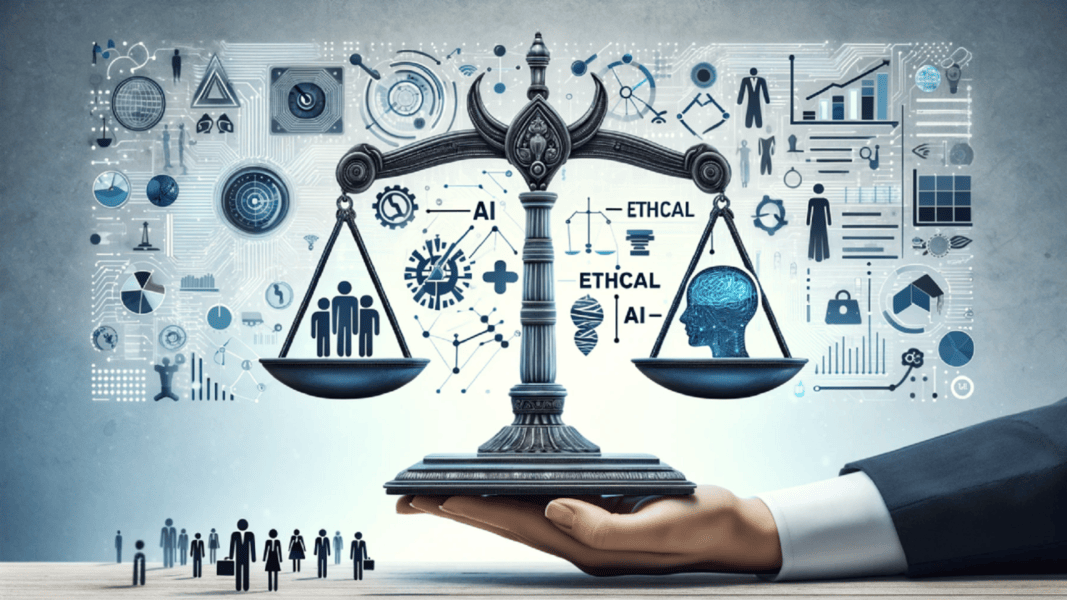Artificial intelligence (AI) is transforming healthcare, dramatically changing how we diagnose, treat, and care for patients. AI-powered imaging tools that can detect diseases earlier and predictive analytics that can tailor treatment strategies are undoubtedly beneficial. However, as AI becomes increasingly prevalent in healthcare, ethical issues, particularly those related to privacy, bias, and liability, are becoming more important. How can we fully leverage the power of AI without violating patients’ rights?
This article explores the delicate balance between ethics and innovation in AI-driven healthcare, analyzing key issues, practical implications, and potential solutions. Whether you work in healthcare, are involved in policymaking, or are a patient, understanding these ethical issues is extremely important for guaranteeing the appropriate use of AI in the future.
The Future of AI in Healthcare:
AI is transforming medicine, making it more accurate, efficient, and accessible. Machine learning algorithms analyze vast amounts of data to predict disease outbreaks, provide treatment recommendations, and even assist with robotic surgery. AI systems like IBM Watson and Google DeepMind have demonstrated faster diagnosis of diseases like cancer and diabetic retinopathy than human doctors. AI-powered telehealth services enable people in underserved areas to receive medical advice remotely. These new concepts promise to reduce healthcare costs, improve patient outcomes, and ease the workload of already overburdened healthcare professionals.
Privacy Issues in AI-Driven Healthcare:
AI requires extensive patient privacy data. While it offers certain benefits, it also poses significant privacy risks. Electronic health records (EHRs), genetic information, and biometric data can be stolen by hackers if not properly protected. The 2017 NHS-DeepMind data-sharing scandal exemplifies the dangers of mishandling patient data. GDPR and HIPAA are strict regulations designed to protect data, but AI’s ability to extract personal information from anonymized datasets makes compliance more difficult. Patients must trust that their data is used ethically, so AI systems must be open about how they collect, store, and process medical data.
Unfair and Biased AI Algorithms:
The fairness of AI systems depends on the data they learn from, and historical healthcare data often reveals how unfair practices can be. Research has shown that some AI models perform poorly with minority groups due to underrepresentation in their training datasets. For example, an algorithm used in a US hospital prioritized white patients over Black patients in advanced care programs. If left unaddressed, such biases can exacerbate health disparities. To prevent AI from perpetuating discrimination in diagnosis and treatment, it is crucial to have broad, inclusive datasets and to regularly audit algorithms.
Maintaining Accountability and Transparency in AI Decisions:
Who is responsible when medical decisions made by AI systems fail? AI lacks the moral autonomy of human physicians, making it difficult to hold them accountable. If an algorithmic error leads to an incorrect diagnosis or treatment, who should bear the responsibility: the developer, the hospital, or the regulator? Explainable AI (XAI) is emerging as a solution because it provides doctors with models that help them understand the decision-making process. However, deep learning systems, which operate as “black boxes,” remain difficult to fully disclose. Clear legal rules are needed to determine who is liable for medical errors caused by AI.
Consent and Patient Freedom:
Informed consent is a fundamental principle of medical ethics; however, AI complicates this principle. Patients may not fully understand how AI applications use their data or the associated risks. Should hospitals inform patients about every AI tool they use, or is that too much information? Dynamic consent models, which allow patients to change their consents over time, offer a satisfactory compromise. Patients should also have the option to decline AI-driven tests and opt for human review. Finding a balance between innovation and respect for patient autonomy is key to preserving trust.
Regulation and Ethics for AI in Healthcare:
Governments and organizations around the world are rapidly developing fair regulations for the use of AI in healthcare. The World Health Organization (WHO) has developed guidelines emphasizing fairness, accountability, and transparency. The U.S. Food and Drug Administration (FDA) has begun regulating medical devices that use AI, requiring extensive testing before approval. However, as AI continues to develop, regulations will need to adapt to close legal loopholes. Technology companies, healthcare providers, and policymakers must collaborate across sectors to develop enforceable standards that protect patient safety without hindering new ideas.
An Ethical AI Future in Healthcare:
Healthcare will eventually use AI, but not necessarily in an ethical manner. Federated learning (where AI learns from decentralized data to protect privacy) and blockchain-based medical records (for secure data sharing) are two potential future advancements. Public awareness campaigns can educate patients about the use of AI in healthcare and help them make informed decisions. The ultimate goal is a healthcare system that enhances, rather than replaces, human expertise while maintaining the highest ethical standards.
Conclusion:
Artificial intelligence has the potential to profoundly transform healthcare, but we cannot ignore the ethical issues it raises. To ensure that AI helps all patients fairly, we must address privacy threats, algorithmic biases, accountability gaps, and informed consent issues. Finding the right balance between innovation and ethics requires a collaborative effort from technologists, healthcare professionals, regulators, and patients. We can responsibly harness AI’s potential by providing strong protections, promoting openness, and prioritizing patient rights. The future of healthcare depends not only on technological advancements but also on our ability to address these ethical issues with wisdom and foresight.
FAQs:
1. How will AI impact patient privacy in healthcare?
AI requires vast amounts of personal health data, making it more vulnerable to hacking or misuse. To protect patient privacy, it is crucial to use strong encryption and anonymization methods and to comply with regulations such as the Health Insurance Portability and Accountability Act (HIPAA).
2. Can AI systems make biased medical diagnoses?
Yes, if AI is trained on undiverse datasets, it can potentially pick up biases that contribute to healthcare disparities. To limit discriminatory outcomes, extensive audits and data collection are necessary.
3. Who is responsible if an AI system makes a medical error?
Responsibility is still being developed, but could lie with the developer, medical professionals, or the institution using the AI. The legal system must clarify who is responsible for AI errors.
4. Are patients entitled to refuse medical judgments from AI?
Yes, ethical healthcare institutions should provide patients with the option to choose human judgment over AI advice to protect their freedom of choice.
5. What regulations exist to ensure the ethical use of AI in healthcare?
Organizations such as the World Health Organization and the U.S. Food and Drug Administration are developing regulations, but there are currently no globally agreed-upon standards. Policies for AI applications focus on fairness, openness, and patient safety.




